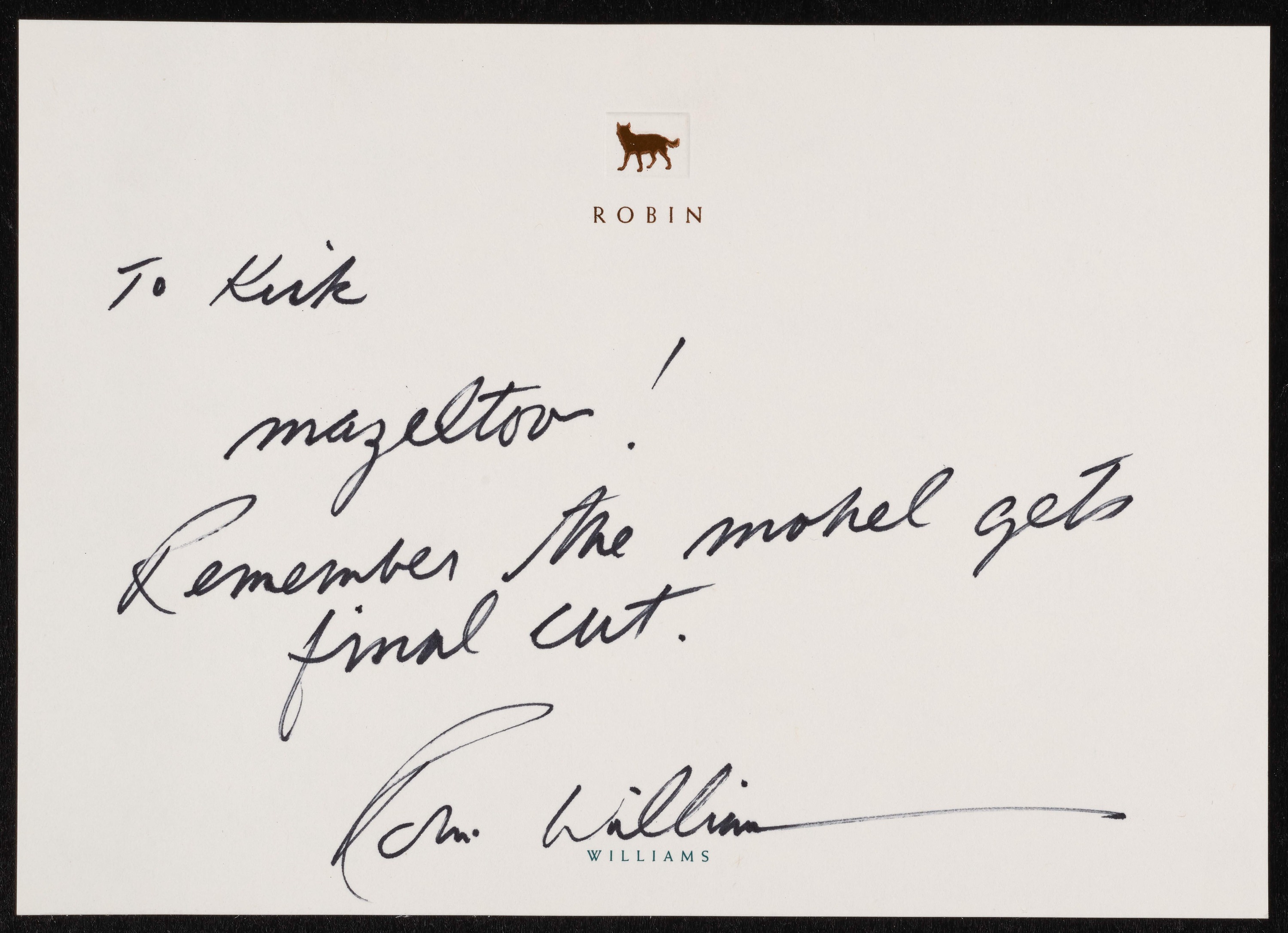Robin Williams Hospital Visit: A Story Of Resilience And Compassion
When you hear the name Robin Williams, you instantly think of laughter, joy, and an unparalleled talent for making people smile. But behind the scenes, this legendary actor had his own battles, including his visits to hospitals. Today, we dive deep into the story of Robin Williams and his hospital experiences, uncovering the human side of a man who touched so many lives.
Robin Williams wasn’t just a comedian or an actor; he was a force of nature. His ability to connect with people, whether through comedy or heartfelt performances, made him a beloved figure worldwide. But like all of us, he faced health challenges that required him to visit hospitals. These visits weren’t just about medical care—they were moments of vulnerability that showed us how even the brightest stars can struggle.
So why are we talking about Robin Williams' hospital visits? Because it’s important to humanize the icons we admire. It’s easy to forget that celebrities are people too, dealing with their own issues, fears, and triumphs. This article isn’t just about Robin—it’s about understanding the resilience and strength it takes to face life’s toughest challenges.
Read also:Aaron Kendrick De Niro The Rising Star Redefining Hollywoodrsquos Legacy
Table of Contents
- Biography of Robin Williams
- Early Career and Rise to Fame
- Health Challenges and Hospital Visits
- Mental Health and Addiction Struggles
- Impact on Healthcare and Compassion
- The Patient Experience: Robin’s Perspective
- Support System and Coping Mechanisms
- Legacy: Lessons from Robin’s Journey
- Building a Compassionate Community
- Conclusion: A Tribute to Resilience
Biography of Robin Williams
Before we dive into the specifics of Robin Williams' hospital visits, let’s take a moment to appreciate the man behind the legend. Robin McLaurin Williams was born on July 21, 1951, in Chicago, Illinois. He grew up in Detroit and later moved to California, where he pursued his passion for acting and comedy.
Robin’s career began with stand-up comedy, where he quickly gained a reputation for his improvisational skills and boundless energy. His big break came when he starred as Mork in the hit TV series "Mork & Mindy," which launched him into superstardom. From there, he went on to star in iconic films like "Good Morning, Vietnam," "Dead Poets Society," and "Good Will Hunting," earning him an Academy Award for Best Supporting Actor.
But Robin’s life wasn’t just about accolades and awards. He was a husband, father, and a deeply compassionate individual who cared deeply about others. His work extended beyond entertainment—he was a vocal advocate for mental health awareness and charitable causes.
Robin Williams Biodata
| Full Name | Robin McLaurin Williams |
|---|---|
| Date of Birth | July 21, 1951 |
| Place of Birth | Chicago, Illinois |
| Occupation | Actor, Comedian, Voice Artist |
| Spouse(s) | Venus Williams (m. 1978–1989), Marsha Garces (m. 1989–2008), Susan Schneider (m. 2011–2014) |
| Children | Zachary Pym, Zelda Rae, Cody Alan |
Early Career and Rise to Fame
Robin’s journey to fame wasn’t an overnight success. He honed his craft through years of hard work and dedication. His early days in stand-up comedy were marked by his unique style of improvisation, where he could switch characters and accents in the blink of an eye. This talent caught the attention of producers, leading to his role in "Mork & Mindy."
What made Robin stand out wasn’t just his comedic timing but his ability to tackle serious topics with grace and humor. Whether he was playing a quirky alien or a wise teacher, his performances resonated with audiences on a deep level. His versatility as an actor allowed him to transcend genres, proving that he was more than just a funny man.
Health Challenges and Hospital Visits
Robin Williams' hospital visits were a reflection of the health challenges he faced throughout his life. In 2009, he underwent heart surgery, which was a significant moment in his journey. While the surgery was successful, it highlighted the importance of taking care of one’s health, even for someone as vibrant and energetic as Robin.
Read also:Alice Rosenblim Erome Unveiling The Rising Star Of Digital Content
But it wasn’t just physical health that Robin had to contend with. Mental health struggles, including depression and anxiety, were part of his reality. These challenges often led him to seek professional help, which included visits to hospitals and rehabilitation centers. His openness about his struggles helped reduce the stigma surrounding mental health issues.
Robin Williams Hospital Visit: The Details
One of the most notable hospital visits occurred in 2014, just months before his passing. Robin was diagnosed with Lewy body dementia, a condition that affects the brain and can cause cognitive decline. This diagnosis shed light on the complexities of his mental and physical health, offering a deeper understanding of his later years.
Mental Health and Addiction Struggles
Robin’s battle with mental health and addiction was well-documented. He was candid about his struggles with substance abuse, which he fought tirelessly to overcome. His commitment to sobriety was an inspiration to many, proving that recovery is possible with the right support and determination.
However, mental health isn’t just about addiction—it’s about the overall well-being of a person. Robin’s experiences with depression and anxiety were a reminder that even the most talented individuals can face inner demons. His willingness to seek help and talk about his struggles paved the way for greater awareness and understanding.
Impact on Healthcare and Compassion
Robin Williams' hospital visits had a profound impact on how we view healthcare and compassion. His experiences highlighted the importance of empathy in medical care. Patients aren’t just numbers—they are people with stories, fears, and hopes. Robin’s interactions with healthcare professionals showed us the value of treating patients with kindness and respect.
Moreover, his advocacy for mental health awareness encouraged others to seek help without fear of judgment. By sharing his story, Robin helped create a more compassionate world where people feel safe discussing their struggles.
The Patient Experience: Robin’s Perspective
What was it like for Robin to be a patient? While we can’t fully know his thoughts and feelings during those moments, we can imagine the mix of vulnerability and resilience he must have felt. Being in a hospital can be daunting, but Robin approached it with the same humor and grace he brought to his performances.
His ability to find light in dark situations was a testament to his character. Whether it was cracking jokes with nurses or finding solace in the company of loved ones, Robin faced his health challenges with courage and dignity.
Support System and Coping Mechanisms
No one should face health challenges alone, and Robin had a strong support system. His family, friends, and fans were there for him during his toughest times. He also relied on therapy, meditation, and creative outlets to cope with his struggles.
Robin’s story teaches us the importance of building a support system and finding healthy ways to manage stress. Whether it’s through therapy, exercise, or creative expression, there are countless ways to navigate life’s challenges.
Legacy: Lessons from Robin’s Journey
Robin Williams' legacy extends far beyond his acting career. His hospital visits and health struggles offer valuable lessons about resilience, compassion, and the importance of seeking help. He showed us that it’s okay to be vulnerable and that asking for help is a sign of strength, not weakness.
His impact on the world of healthcare and mental health awareness cannot be overstated. By sharing his story, Robin helped break down barriers and create a more understanding society. His legacy lives on through the countless lives he touched and the conversations he inspired.
Building a Compassionate Community
Robin’s journey reminds us of the power of community. Whether it’s supporting a friend through a tough time or advocating for better healthcare policies, we all have a role to play in creating a more compassionate world. His story encourages us to reach out to others, offer a helping hand, and spread kindness wherever we go.
As we reflect on Robin’s life and legacy, let’s commit to building a community that values empathy, understanding, and support. Together, we can make a difference in the lives of those around us.
Conclusion: A Tribute to Resilience
In conclusion, Robin Williams' hospital visits were more than just medical events—they were moments of vulnerability and strength. Through his struggles, he taught us the importance of resilience, compassion, and seeking help when needed. His legacy continues to inspire us to be better versions of ourselves and to treat others with kindness and understanding.
We invite you to share your thoughts and experiences in the comments below. Whether you’ve been inspired by Robin’s story or have your own journey to share, your voice matters. And don’t forget to explore other articles on our site for more insights and inspiration.
Remember, life’s challenges may knock us down, but it’s our resilience and the support of those around us that help us rise again. Thank you, Robin, for being a beacon of light in so many lives.
sources: NY Times, BBC, Mayo Clinic


